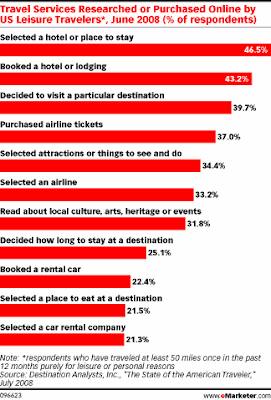JULY 21, 2008
Price beats brands when times are tight.
More than four out of 10 US nonbusiness travelers surveyed expect to reduce the number of trips they will take in the coming year as a result of the economy, according to a June 2008 Destination Analysts' "The State of the American Traveler" survey. Nearly three out of 10 said they would spend less for their recreational trips in the next 12 months, nearly double the percentage that said so 12 months ago.
In the past 12 months, 23.6% of leisure travelers said they had taken a "staycation"—a vacation spent at home—in response to gasoline prices. Nearly three out of 10 said they planned to do so within the next 12 months.
"With more than half of travelers saying they will actively look for travel bargains and discounts and another third saying they will visit less expensive destinations, affordability is certain to be top-of-mind," said Erin Francis, managing partner at Destination Analysts, in a statement.
Several types of travel services were researched and purchased online by at least one-third of respondents, including destination information, hotel rooms and airline tickets. Only about one-fifth of recreational travelers went online for car rentals.
 Fully 72.2% of Internet users in the US named the Web as their primary source for travel research in June 2008, according to a Prospectiv study.
Fully 72.2% of Internet users in the US named the Web as their primary source for travel research in June 2008, according to a Prospectiv study.
The focus on value matters because price trumps brand in an economic downturn, according to a survey of consumers in the UK conducted by Loudhouse and RightNow.
Nearly eight out of 10 Internet users surveyed said that prices drove their purchase decisions during times of economic uncertainty. More than seven out of 10 also said that price and good online user experience were the second-highest-influencing factor on where to buy a product. Brand pedigree, product uniqueness and reputation were listed as least influential.
"Brands selling directly to the consumer be warned; as the credit crunch deepens and spending decreases, offering 'sweeteners' to consumers is only half the survival story," said Joe Brown, general manager at RightNow, in a Travolution article. "They won't tolerate corners being cut when it comes to customer service."
Although most travelers are getting budget-conscious, the luxury travel segment has yet to feel a slowdown, according to a July 2008 USA Today article. The article cited D.K. Shifflet & Associates' claim that households earning $100,000 and more now account for about one-third of hotel stays. "High-end is holding its own right now," Doug Shifflet, CEO of D.K. Shifflet, told USA Today. "But if the economy doesn't improve some, then it's going to start to see an additional slowdown."
eMarketer's US Travel Online: Planning and Booking report will be published next month. Click here to be notified when it is released.
Price beats brands when times are tight.
More than four out of 10 US nonbusiness travelers surveyed expect to reduce the number of trips they will take in the coming year as a result of the economy, according to a June 2008 Destination Analysts' "The State of the American Traveler" survey. Nearly three out of 10 said they would spend less for their recreational trips in the next 12 months, nearly double the percentage that said so 12 months ago.
In the past 12 months, 23.6% of leisure travelers said they had taken a "staycation"—a vacation spent at home—in response to gasoline prices. Nearly three out of 10 said they planned to do so within the next 12 months.
"With more than half of travelers saying they will actively look for travel bargains and discounts and another third saying they will visit less expensive destinations, affordability is certain to be top-of-mind," said Erin Francis, managing partner at Destination Analysts, in a statement.
Several types of travel services were researched and purchased online by at least one-third of respondents, including destination information, hotel rooms and airline tickets. Only about one-fifth of recreational travelers went online for car rentals.
 Fully 72.2% of Internet users in the US named the Web as their primary source for travel research in June 2008, according to a Prospectiv study.
Fully 72.2% of Internet users in the US named the Web as their primary source for travel research in June 2008, according to a Prospectiv study.The focus on value matters because price trumps brand in an economic downturn, according to a survey of consumers in the UK conducted by Loudhouse and RightNow.
Nearly eight out of 10 Internet users surveyed said that prices drove their purchase decisions during times of economic uncertainty. More than seven out of 10 also said that price and good online user experience were the second-highest-influencing factor on where to buy a product. Brand pedigree, product uniqueness and reputation were listed as least influential.
"Brands selling directly to the consumer be warned; as the credit crunch deepens and spending decreases, offering 'sweeteners' to consumers is only half the survival story," said Joe Brown, general manager at RightNow, in a Travolution article. "They won't tolerate corners being cut when it comes to customer service."
Although most travelers are getting budget-conscious, the luxury travel segment has yet to feel a slowdown, according to a July 2008 USA Today article. The article cited D.K. Shifflet & Associates' claim that households earning $100,000 and more now account for about one-third of hotel stays. "High-end is holding its own right now," Doug Shifflet, CEO of D.K. Shifflet, told USA Today. "But if the economy doesn't improve some, then it's going to start to see an additional slowdown."
eMarketer's US Travel Online: Planning and Booking report will be published next month. Click here to be notified when it is released.


